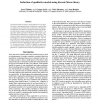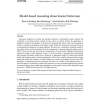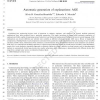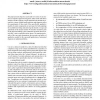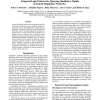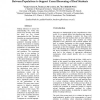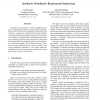123
click to vote
AI
2011
Springer
14 years 9 months ago
2011
Springer
Qualitative models are often a useful abstraction of the physical world. Learning qualitative models from numerical data sible way to obtain such an abstraction. We present a new ...
109
click to vote
AI
2000
Springer
15 years 1 months ago
2000
Springer
Automated handling of tutoring and training functions in educational systems requires the availability of articulate domain models. In this article we further develop the applicat...
112
click to vote
EAAI
2007
15 years 2 months ago
2007
Explaining how engineering devices work is important to students, engineers, and operators. In general, machine generated explanations have been produced from a particular perspec...
142
click to vote
JAIR
2008
15 years 2 months ago
2008
Experience in the physical sciences suggests that the only realistic means of understanding complex systems is through the use of mathematical models. Typically, this has come to ...
209
click to vote
XPS
1997
15 years 3 months ago
1997
The paper presents objectives and results of a series of case studies in computer support for diagnosis, failure mode and effects analysis, and the creation of repair manuals in t...
126
click to vote
ECAI
2008
Springer
15 years 3 months ago
2008
Springer
Formal verification based on model checking provides a powerful technology to query qualitative models of dynamical systems. The application of model-checking approaches is hamper...
113
click to vote
AIED
2005
Springer
15 years 7 months ago
2005
Springer
Making inferences is crucial for understanding the world. The school may develop such skills but there are few formal opportunities for that. This paper describes an experiment de...
103
click to vote
SEW
2006
IEEE
15 years 8 months ago
2006
IEEE
Acquisition of “quantitative” models of sufficient accuracy to enable effective analysis of requirements tradeoffs is hampered by the slowness and difficulty of obtaining su...
